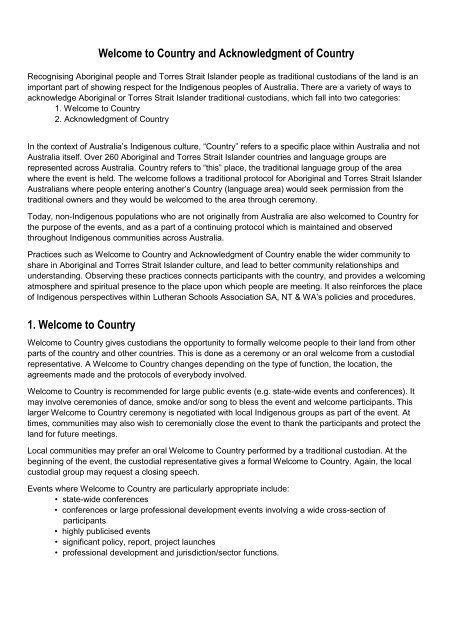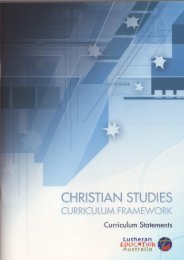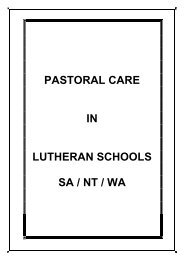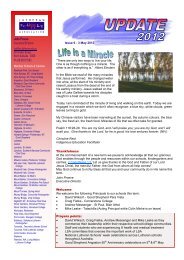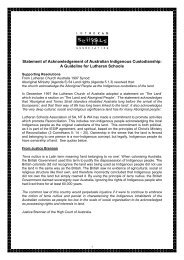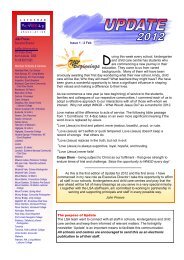Welcome to Country and Acknowledgment of Country - Lutheran ...
Welcome to Country and Acknowledgment of Country - Lutheran ...
Welcome to Country and Acknowledgment of Country - Lutheran ...
Create successful ePaper yourself
Turn your PDF publications into a flip-book with our unique Google optimized e-Paper software.
<strong>Welcome</strong> <strong>to</strong> <strong>Country</strong> <strong>and</strong> <strong>Acknowledgment</strong> <strong>of</strong> <strong>Country</strong><br />
Recognising Aboriginal people <strong>and</strong> Torres Strait Isl<strong>and</strong>er people as traditional cus<strong>to</strong>dians <strong>of</strong> the l<strong>and</strong> is an<br />
important part <strong>of</strong> showing respect for the Indigenous peoples <strong>of</strong> Australia. There are a variety <strong>of</strong> ways <strong>to</strong><br />
acknowledge Aboriginal or Torres Strait Isl<strong>and</strong>er traditional cus<strong>to</strong>dians, which fall in<strong>to</strong> two categories:<br />
1. <strong>Welcome</strong> <strong>to</strong> <strong>Country</strong><br />
2. <strong>Acknowledgment</strong> <strong>of</strong> <strong>Country</strong><br />
In the context <strong>of</strong> Australia’s Indigenous culture, “<strong>Country</strong>” refers <strong>to</strong> a specific place within Australia <strong>and</strong> not<br />
Australia itself. Over 260 Aboriginal <strong>and</strong> Torres Strait Isl<strong>and</strong>er countries <strong>and</strong> language groups are<br />
represented across Australia. <strong>Country</strong> refers <strong>to</strong> “this” place, the traditional language group <strong>of</strong> the area<br />
where the event is held. The welcome follows a traditional pro<strong>to</strong>col for Aboriginal <strong>and</strong> Torres Strait Isl<strong>and</strong>er<br />
Australians where people entering another’s <strong>Country</strong> (language area) would seek permission from the<br />
traditional owners <strong>and</strong> they would be welcomed <strong>to</strong> the area through ceremony.<br />
Today, non-Indigenous populations who are not originally from Australia are also welcomed <strong>to</strong> <strong>Country</strong> for<br />
the purpose <strong>of</strong> the events, <strong>and</strong> as a part <strong>of</strong> a continuing pro<strong>to</strong>col which is maintained <strong>and</strong> observed<br />
throughout Indigenous communities across Australia.<br />
Practices such as <strong>Welcome</strong> <strong>to</strong> <strong>Country</strong> <strong>and</strong> <strong>Acknowledgment</strong> <strong>of</strong> <strong>Country</strong> enable the wider community <strong>to</strong><br />
share in Aboriginal <strong>and</strong> Torres Strait Isl<strong>and</strong>er culture, <strong>and</strong> lead <strong>to</strong> better community relationships <strong>and</strong><br />
underst<strong>and</strong>ing. Observing these practices connects participants with the country, <strong>and</strong> provides a welcoming<br />
atmosphere <strong>and</strong> spiritual presence <strong>to</strong> the place upon which people are meeting. It also reinforces the place<br />
<strong>of</strong> Indigenous perspectives within <strong>Lutheran</strong> Schools Association SA, NT & WA’s policies <strong>and</strong> procedures.<br />
1. <strong>Welcome</strong> <strong>to</strong> <strong>Country</strong><br />
<strong>Welcome</strong> <strong>to</strong> <strong>Country</strong> gives cus<strong>to</strong>dians the opportunity <strong>to</strong> formally welcome people <strong>to</strong> their l<strong>and</strong> from other<br />
parts <strong>of</strong> the country <strong>and</strong> other countries. This is done as a ceremony or an oral welcome from a cus<strong>to</strong>dial<br />
representative. A <strong>Welcome</strong> <strong>to</strong> <strong>Country</strong> changes depending on the type <strong>of</strong> function, the location, the<br />
agreements made <strong>and</strong> the pro<strong>to</strong>cols <strong>of</strong> everybody involved.<br />
<strong>Welcome</strong> <strong>to</strong> <strong>Country</strong> is recommended for large public events (e.g. state-wide events <strong>and</strong> conferences). It<br />
may involve ceremonies <strong>of</strong> dance, smoke <strong>and</strong>/or song <strong>to</strong> bless the event <strong>and</strong> welcome participants. This<br />
larger <strong>Welcome</strong> <strong>to</strong> <strong>Country</strong> ceremony is negotiated with local Indigenous groups as part <strong>of</strong> the event. At<br />
times, communities may also wish <strong>to</strong> ceremonially close the event <strong>to</strong> thank the participants <strong>and</strong> protect the<br />
l<strong>and</strong> for future meetings.<br />
Local communities may prefer an oral <strong>Welcome</strong> <strong>to</strong> <strong>Country</strong> performed by a traditional cus<strong>to</strong>dian. At the<br />
beginning <strong>of</strong> the event, the cus<strong>to</strong>dial representative gives a formal <strong>Welcome</strong> <strong>to</strong> <strong>Country</strong>. Again, the local<br />
cus<strong>to</strong>dial group may request a closing speech.<br />
Events where <strong>Welcome</strong> <strong>to</strong> <strong>Country</strong> are particularly appropriate include:<br />
• state-wide conferences<br />
• conferences or large pr<strong>of</strong>essional development events involving a wide cross-section <strong>of</strong><br />
participants<br />
• highly publicised events<br />
• significant policy, report, project launches<br />
• pr<strong>of</strong>essional development <strong>and</strong> jurisdiction/sec<strong>to</strong>r functions.
2. <strong>Acknowledgment</strong> <strong>of</strong> <strong>Country</strong><br />
<strong>Acknowledgment</strong> <strong>of</strong> <strong>Country</strong> usually occurs when traditional cus<strong>to</strong>dians are not available <strong>to</strong> provide an<br />
<strong>of</strong>ficial <strong>Welcome</strong> <strong>to</strong> <strong>Country</strong>, or the scale <strong>of</strong> the function does not warrant a traditional welcome.<br />
An <strong>Acknowledgment</strong> <strong>of</strong> <strong>Country</strong> shows respect by acknowledging that the event is happening on traditional<br />
cus<strong>to</strong>dial l<strong>and</strong>, thanks the cus<strong>to</strong>dians for allowing the event <strong>to</strong> take place, <strong>and</strong> sets a concilia<strong>to</strong>ry <strong>to</strong>ne for<br />
the event.<br />
<strong>Acknowledgment</strong> <strong>of</strong> <strong>Country</strong> is a way that the wider community can show respect for Aboriginal <strong>and</strong> Torres<br />
Strait Isl<strong>and</strong>er pro<strong>to</strong>col, <strong>and</strong> acknowledge the ongoing relationships between the traditional cus<strong>to</strong>dians <strong>and</strong><br />
the spiritual <strong>and</strong> cultural practices <strong>of</strong> the local area. It is a significant <strong>and</strong> symbolic reconciliation gesture.<br />
Most city <strong>and</strong> local councils, government departments <strong>and</strong> many other organisations are adopting the<br />
practice <strong>of</strong> acknowledging the local Aboriginal or Torres Strait Isl<strong>and</strong>er traditional cus<strong>to</strong>dians at meetings,<br />
<strong>of</strong>ficial events <strong>and</strong> ceremonies. <strong>Acknowledgment</strong> <strong>of</strong> <strong>Country</strong> is a matter <strong>of</strong> pro<strong>to</strong>col at events involving<br />
external personnel, sec<strong>to</strong>r or community representatives.<br />
Governments encourages managers, education <strong>of</strong>ficers, executives, committee chairs, community leaders<br />
<strong>and</strong> individuals <strong>to</strong> include relevant acknowledgments in speeches they make at public meetings <strong>and</strong><br />
forums. See: <br />
Developing an <strong>Acknowledgment</strong> <strong>of</strong> <strong>Country</strong><br />
An <strong>Acknowledgment</strong> <strong>of</strong> <strong>Country</strong> is both a personal <strong>and</strong> pr<strong>of</strong>essional pro<strong>to</strong>col. Developing an<br />
<strong>Acknowledgment</strong> <strong>of</strong> <strong>Country</strong> may take time. It should reflect a personal approach <strong>and</strong> not be a seen as an<br />
organisational directive. The Dare <strong>to</strong> Lead coalition can provide further guidance on this through their<br />
website: .<br />
The following statement is used by Brian Giles-Browne in the work he does in New South Wales:<br />
We acknowledge the traditional cus<strong>to</strong>dians <strong>of</strong> this l<strong>and</strong> <strong>and</strong> pay our respects <strong>to</strong> the elders both past, present <strong>and</strong><br />
future for they hold the memories, the traditions, the culture <strong>and</strong> hopes <strong>of</strong> Aboriginal Australia. We must always<br />
remember that under the concrete <strong>and</strong> asphalt this l<strong>and</strong> is, was <strong>and</strong> always will be traditional Aboriginal l<strong>and</strong>.<br />
The following statement was used at the Dare <strong>to</strong> Lead national, state <strong>and</strong> terri<strong>to</strong>ry launches. You are<br />
welcome <strong>to</strong> adapt it (e.g. using the name <strong>of</strong> the people instead <strong>of</strong> the generic “first people”, changing the<br />
last line so it refers <strong>to</strong> a particular project, agreement etc.):<br />
Paying respect <strong>to</strong> the first peoples on whose l<strong>and</strong> we are, Acknowledging the loss <strong>of</strong> l<strong>and</strong>s, cultures <strong>and</strong><br />
treasures, Knowing the consequences for people, communities <strong>and</strong> nations, Believing we can walk <strong>to</strong>gether <strong>to</strong> a<br />
better future, We meet <strong>to</strong>day.<br />
Other alternatives for use or adaptation are:<br />
I would like <strong>to</strong> acknowledge the [language name/s if known] traditional cus<strong>to</strong>dians <strong>of</strong> the l<strong>and</strong> upon which we<br />
meet <strong>and</strong> the important role that these cus<strong>to</strong>dians play in maintaining gathering places such as these for our<br />
collective use.<br />
I would like <strong>to</strong> acknowledge the Indigenous peoples <strong>of</strong> South Australia [or other location e.g. Adelaide, Clare,<br />
Murray Bridge] <strong>and</strong> particularly honour <strong>and</strong> thank the traditional cus<strong>to</strong>dians <strong>of</strong> the [language name/s if known]<br />
l<strong>and</strong> upon which we meet. Thank you for providing access <strong>to</strong> this part <strong>of</strong> your country.<br />
Our organisation affirms that Aboriginal people <strong>and</strong> Torres Strait Isl<strong>and</strong>er people are the Indigenous peoples <strong>of</strong><br />
Australia. Before we proceed with <strong>to</strong>day’s meeting, I would like <strong>to</strong> acknowledge the traditional cus<strong>to</strong>dians <strong>of</strong> the<br />
l<strong>and</strong> upon which we meet <strong>and</strong> welcome you <strong>to</strong> this area.<br />
Over time, individuals will develop their own preferred style <strong>and</strong> approach <strong>to</strong> <strong>Acknowledgment</strong> <strong>of</strong> <strong>Country</strong>,<br />
<strong>and</strong> this will change depending on the context <strong>and</strong> place <strong>of</strong> the event or meeting.
It is appropriate <strong>to</strong> give an <strong>Acknowledgment</strong> <strong>of</strong> <strong>Country</strong> at the start <strong>of</strong> a meeting or daily proceedings. Often<br />
individuals involved in speaking throughout a day or within meetings will also provide a personal<br />
<strong>Acknowledgment</strong> <strong>of</strong> <strong>Country</strong>, <strong>and</strong> this is entirely appropriate.<br />
Community engagement in observing pro<strong>to</strong>cols<br />
Aboriginal people <strong>and</strong> Torres Strait Isl<strong>and</strong>er people from the wider community can provide advice on when<br />
<strong>to</strong> use <strong>Welcome</strong> <strong>to</strong> <strong>Country</strong> ceremonies, <strong>Acknowledgment</strong> <strong>of</strong> <strong>Country</strong> <strong>and</strong> other Indigenous pro<strong>to</strong>cols in<br />
events or functions.<br />
It is important <strong>to</strong> note that the meaning <strong>of</strong> ceremonies <strong>and</strong> practices differ from place <strong>to</strong> place. Therefore it<br />
is very important <strong>to</strong> work <strong>to</strong>gether <strong>to</strong> decide on when <strong>and</strong> where ceremonies <strong>and</strong> acknowledgments should<br />
take place, the format <strong>of</strong> the ceremony, who could <strong>and</strong> should be involved <strong>and</strong> an appropriate level <strong>of</strong><br />
remuneration.<br />
The process will not always be easy.<br />
Observing Aboriginal pro<strong>to</strong>cols <strong>and</strong> Torres Strait Isl<strong>and</strong>er pro<strong>to</strong>cols includes allowing time for traditional<br />
decision making <strong>and</strong> discussion. <strong>Welcome</strong> <strong>to</strong> County must be given by an appropriate person or delegated<br />
representative from the traditional Aboriginal or Torres Strait Isl<strong>and</strong>er cus<strong>to</strong>dian’s group.<br />
http://www.qsa.qld.edu.au/downloads/approach/indigenous_p001_0802.pdf


